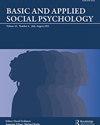自我极化:将同意的人奉为偶像,将不同意的人妖魔化
IF 1.8
3区 心理学
Q2 PSYCHOLOGY, SOCIAL
引用次数: 0
摘要
最近的许多文本都解释了社会两极分化,强调通过增加极端党派信息的可访问性来进行有偏见的输入。相反,我们通过人格特质的偏见归因来检验偏见产出的可能作用。两个实验验证了这样一个假设:将性格特征归因于那些在有争议的社会问题上同意或不同意一个归因者的人,可能会导致归因者对问题党派采取更两极分化的印象和行为意图,以及对问题本身采取更两极分化的态度。这些假设得到了两个不同的社会问题的支持——堕胎和在国歌时下跪。研究结果与前人关于归因偏误和自生态度极化的理论和研究结果一致。本文章由计算机程序翻译,如有差异,请以英文原文为准。
Self-Polarization: Lionizing Those Who Agree and Demonizing Those Who Disagree
Abstract Numerous recent texts have explained societal polarization, emphasizing biased input through increased accessibility of extreme partisan information. We examined instead the possible role of biased output through biased attribution of personality traits to issue partisans. Two experiments tested the hypothesis that attributing personality traits to those who agree versus disagree with an attributor on controversial social issues might lead attributors to adopt more polarized impressions and behavioral intentions toward issue partisans, as well as to adopt more polarized attitudes toward the issue itself. These hypotheses were supported with two different social issues—abortion and kneeling during the national anthem. The results were interpreted as consistent with previous theory and research on both attributional bias and self-generated attitude polarization.
求助全文
通过发布文献求助,成功后即可免费获取论文全文。
去求助
来源期刊

Basic and Applied Social Psychology
PSYCHOLOGY, SOCIAL-
CiteScore
4.50
自引率
12.50%
发文量
7
期刊介绍:
Basic and Applied Social Psychology (BASP) emphasizes the publication of outstanding research articles, but also considers literature reviews, criticism, and methodological or theoretical statements spanning the entire range of social psychological issues. The journal will publish basic work in areas of social psychology that can be applied to societal problems, as well as direct application of social psychology to such problems. The journal provides a venue for a broad range of specialty areas, including research on legal and political issues, environmental influences on behavior, organizations, aging, medical and health-related outcomes, sexuality, education and learning, the effects of mass media, gender issues, and population problems.
 求助内容:
求助内容: 应助结果提醒方式:
应助结果提醒方式:


